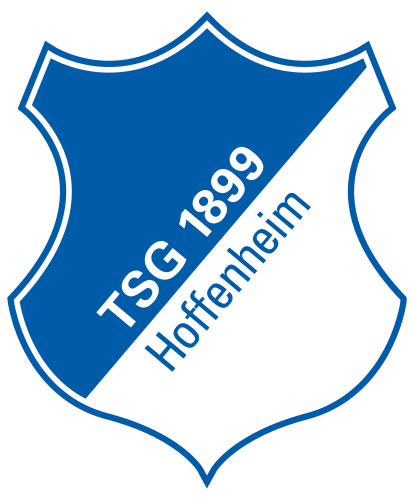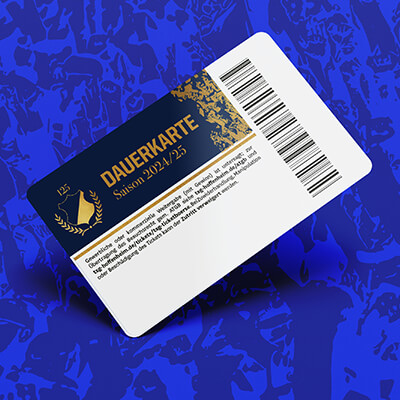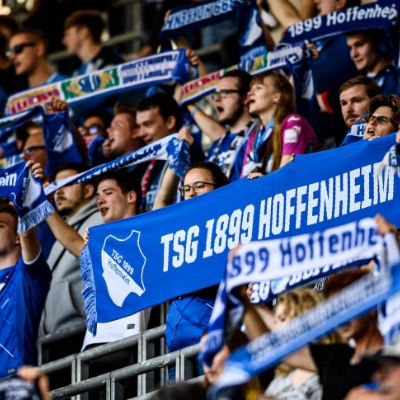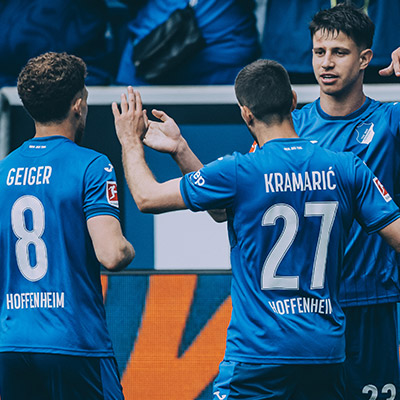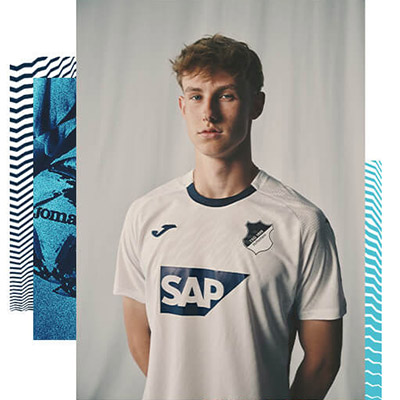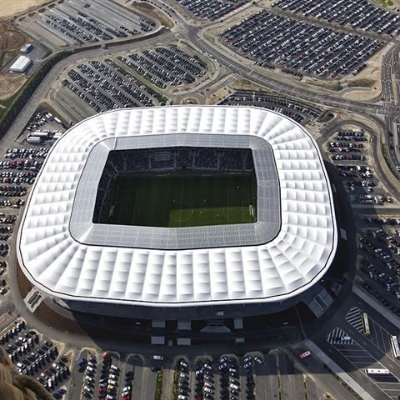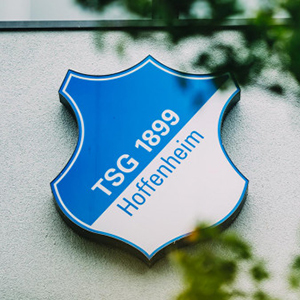The mother of all defeats
For Achim Heinlein, it's a journey into his own past. He cast a glance across the pitch at the sports complex in Elsenz, to the goal on the far side bordering the forest. "We were playing towards that goal in the second half," he said. It's as though he's replaying the scene in his head, envisaging the moment when player manager Peter Podkalicki, nicknamed "Podder", had a huge chance saved by Stebbach shot-stopper Stoll in the 89th minute. TSG Hoffenheim were relegated less than an hour later.
Almost three decades on, he was one of four men returning to the scene on a rainy May evening in Elsenz. The quartet – brothers Achim and Willi Heinlein, TSG president Peter Hofmann and the mayor of Eppingen Klaus Holaschke – are all there to speak to SPIELFELD. Four men who have all made their own way in life but have that shared memory from 30 years ago: the relegation/promotion play-off on Wednesday 14 June 1989. 1.FC Stebbach, runners-up in Kreisliga A, against relegation battlers TSG Hoffenheim of the Bezirksliga. Kick-off at 18:45 in Elsenz. "There was lots of excitement. It was extraordinarily warm, a wonderful day," recalled Klaus Holaschke, who was in the 1. FC Stebbach XI. "There were definitely 1,000 people here," he said as he glanced around the complex.
Start of a singular success story
One of the spectators watching on that fateful day was Dietmar Hopp. Now the TSG Hoffenheim patron but then a 49-year-old businessman, Hopp was on the way back from attending the first annual general meeting of his company SAP in Karlsruhe when he decided to drop by and support his hometown club. "I didn't even know that he was there," said TSG president Peter Hofmann, a young lad then just 26 years of age who was working as the Hoffenheim team organiser. "I only knew Dietmar Hopp from the stories that were told in the pub," recalled Hofmann, adding: "I'd only heard that he had played for TSG for many years and had been given a tin of liver sausage for every goal he scored." Hofmann would soon have better memories to recall. Because that relegation/promotion play-off in Elsenz marked the start of a singular success story in German football – for the losers. For TSG, it was the mother of all defeats; but it was also the day when Dietmar Hopp decided to give his hometown club his backing.
"I'd never lost my interest in football or in TSG," said Dietmar Hopp, who had watched the match in Elsenz alongside the former TSG Hoffenheim president Theo Berberich. "When I saw that we'd now be dropping down another division, I said to Theo that I wanted to get involved," Hopp told SPIELFELD. Hoffenheim were beaten 4-2 in extra-time on that sunny June evening in Elsenz, sealing their relegation to Kreisliga A. "It was humiliating for us," said Willi Heinlein, who is now a staff member working with the Hoffenheim U23s. His memories of the match? "Banished, repressed. Fortunately." Klaus Holaschke, however, who was playing alongside his brother Rolf for Stebbach that day, has no problems remembering details from the game. It is always easier to remember if you were on the winning side. "We quickly went 2-0 up, but were then pegged back and had our backs to the wall," explained Holaschke, a combative midfield player. "A dangerous defensive midfielder," in the words of Willi and Achim Heinlein.
"It was a momentous occasion"
And then came that gilt-edged chance for the late Peter Podkalicki. He spurned it and the match went to extra-time, where Stebbach scored twice to seal the victory. "For a small village like ours, it was a momentous occasion," said Holaschke, whose position as the mayor of Eppingen (since 2004) makes him pretty much the head honcho here in the district of Elsenz. "Thanks for beating us that day," said Peter Hofmann three decades later with a broad smile, as he handed over a signed TSG Hoffenheim shirt from their Champions League campaign to Klaus Holaschke. Almost a kind of compensation. 1. FC Stebbach, playing as SG Stebbach/Richen, are battling for promotion back to Kreisliga A. Two of Klaus Holaschke's sons are in the team.
It's an amusing footnote, 30 years later, one of the many stories, names and fragments of memories flying around the clubhouse at FV Elsenz. With every passing moment, the memories are returning. It's almost like a journey back in time to the year 1989, to a time when Achim Heinlein had to ask the army for leave and used a ruse to get himself out of an upcoming march ("I could never run in jackboots and always used to get sore feet"). Klaus Holaschke, meanwhile, travelled more than 120 kilometres from his workplace in Swabia, while Willi Heinlein had been training for the match in private every single evening.
TSG Hoffenheim had been battling the drop for the whole 1988/89 campaign, unluckily losing many matches and rarely picking up the kind of results that were deserved on the balance of play. "In actual fact, it was a bit like last season," laughed Willi Heinlein. Just a lot further down the food chain. But the TSG officials tried almost everything they could. During the winter break, legendary coach Emil Kühnle was appointed. Then, for the relegation/promotion play-off, Peter Hofmann had organised a masseur. On the day of the match, the team gathered at midday at the TSG clubhouse on the edge of the Großer Wald, where they were served coffee and cakes. A team meeting was followed by a walk in the woods. "All the attention the squad was getting was doing them no good," joked Peter Hofmann. It went on to become a nadir in TSG's history – but it marked the start of an upward trajectory. Because, as was promised, then TSG president Theo Berberich's telephone rang the day after the ignominy of Elsenz. Dietmar Hopp was on the other end of the line. He invited Berberich; Siegbert Hoffmann, then head of football affairs; and the young Peter Hofmann, team organiser, to his SAP office in Walldorf. Sunday at 10am.
"Like winning the lottery"
"My hands were covered in sweat," said Peter Hofmann as he recalled that meeting. "And they got even sweatier when he addressed me, just a young lad, so informally." Dietmar Hopp offered the club his help. Initially, it wasn't about making waves or professional football. Reaching the same level as the mighty SV Sandhausen was still a long way off in June of 1989. Dietmar Hopp funded balls, training kits, supplies, minor infrastructure. "For me, it was always primarily about youth," said Hopp. "Back then at TSG, the youth football was pretty much limited to kickabouts. I absolutely wanted to change that." The Hoffenheim club officials were grateful, there was only one condition they were likely to have balked at. "We had to promise everything down to the last sausage would be accounted for," said Peter Hofmann.
That they did, and two years later TSG were promoted. Then, one evening, Erwin Rupp, a Sandhausen legend as a player, walked into the Hoffenheim changing rooms. It was then that everyone knew things were getting serious. The rest is history. "Nowadays I get goosebumps every day when I drive along the A6 and see the stadium" said Willi Heinlein. "Bundesliga here in Hoffenheim, with our TSG. It's inconceivable, it's like winning the lottery." And it all started that day, on 14 June 1989.
SPIELFELD is the TSG 1899 Hoffenheim club magazine. Brimming with important content about TSG and the region, SPIELFELD is published 11 times per year. You can pick up your copy free of charge in the Fan Shop or have it delivered to your home. The shipping cost is only €18.99.



